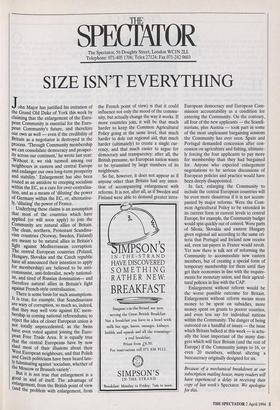SPECTAT THE OR
The Spectator, 56 Doughty Street, London WC1N 2LL Telephone: 071-405 1706; Telex 27124; Fax 071-242 0603
SIZE ISN'T EVERYTHING
John Major has justified his imitation of the Grand Old Duke of York this week by claiming that the enlargement of the Euro- pean Community is essential for the Euro- pean Community's future, and therefore our own as well — even if the credibility of Britain as a negotiator is destroyed in the process. 'Through Community membership we can consolidate democracy and prosper- ity across our continent,' he wrote last year: 'Without it, we risk turmoil among our neighbours in eastern and central Europe and endanger our own long-term prosperity and stability.' Enlargement has also been touted as an antidote to creeping socialism Within the EC, as a cure for over-centralisa- tion, and as a means of 'diluting' the power of Germany within the EC, or, alternative- ly, 'diluting' the power of France.
Underlying these claims is an assumption that most of the countries which have applied (or will soon apply) to join the Community are natural allies of Britain. The clean, northern, Protestant Scandina- vian countries (Norway, Sweden, Finland) are meant to be natural allies in Britain's fight against Mediterranean corruption. The central European countries (Poland, Hungary, Slovakia and the Czech republic have all announced their intention to apply for membership) are believed to be anti- Fommunist, anti-federalist, newly national- ist, and tired of Russian domination— and therefore natural allies in Britain's fight against French-style centralisation. There is some basis for such assumptions. It is true, for example, that Scandinavians are wary of corruption, so much so, indeed, that they may well vote against EC mem- bership in coming national referendums; to reject the idea of closer European union is not totally unprecedented, as the Swiss have even voted against joining the Euro- pean Free Trade Area. It is equally true that the central Europeans have by now shed most of their illusions about their West European neighbours, and that Polish and Czech politicians have been heard late- fulminating against 'socialism, whether of the Moscow or Brussels variety'.
But it is not true that enlargement is a good in and of itself. The advantage of enlargement, from the British point of view and the problem with enlargement, from
the French point of view) is that it could influence not only the mood of the commu- nity, but actually change the way it works. If more countries join, it will be that much harder to keep the Common Agricultural Policy going at the same level, that much harder to dole out regional aid, that much harder (ultimately) to create a single cur- rency, and that much easier to argue for democracy and transparency: after all, the British presume, no European nation wants to be tyrannised by large numbers of its neighbours.
So far, however, it does not appear as if anyone other than Britain had any inten- tion of accompanying enlargement with reforms. It is not, after all, as if Sweden and Finland were able to demand greater intra- European democracy and European Com- mission accountability as a condition for entering the Community. On the contrary, all four of the new applicants — the Scandi- navians, plus Austria — took part in some of the most unpleasant bargaining sessions the Community has ever seen. Spain and Portugal demanded concession after con- cession on agriculture and fishing, ultimate- ly forcing the four applicants to pay more for membership than they had bargained for. Anyone who expected enlargement negotiations to be serious discussions of European policies and practice would have been deeply disappointed.
In fact, enlarging the Community to include the central European countries will be even more disastrous if it is not accom- panied by major reforms. Were the Com- mon Agricultural Policy to be extended in its current form at current levels to central Europe, for example, the Community budget would spin quickly out of control. Were parts of Silesia, Slovakia and eastern Hungary given regional aid according to the same cri- teria that Portugal and Ireland now receive aid, even tax-payers in France would revolt. Yet now there is talk not of reforming the Community to accommodate new eastern members, but of creating a special form of temporary membership for them until they get their economies in line with the require- ments for monetary union, and their agricul- tural policies in line with the CAP.
Enlargement without reform would be the worse possible outcome for Britain. Enlargement without reform means more money to be spent on subsidies, more money spent on grants to poorer counties, and even less say for individual nations within the Community. The danger of being outvoted on a handful of issues — the issue which Britain balked at this week — is actu- ally the least important of the many dan- gers which will face Britain (and the rest of Europe) if the Community jumps to 16, or even 20 members, without altering a bureaucracy originally designed for six.


























































 Previous page
Previous page